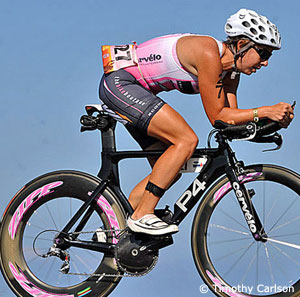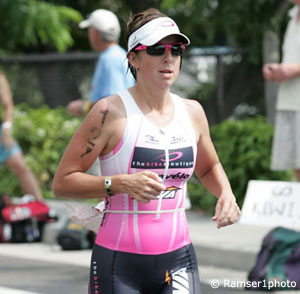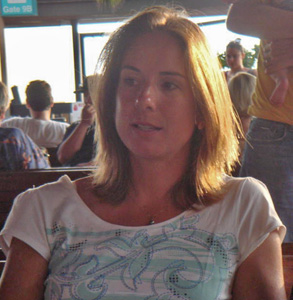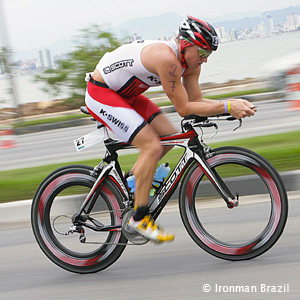The Goodbye of Tereza Macel

Tereza Macel announced that she is stepping away from the professional triathlon racing circuit and the announcement came as quite a surprise. Not that we should expect these Pros to race forever, but it still seems to come out of nowhere. With wins at Embrunman and Ironman Brazil in 2010, she can certainly say that she walked away from racing on a high note. Tez talked with slowtwitch about the decision and what might be next.
Slowtwitch: Tez, your recent announcement certainly surprised us, but we are most likely not alone with those thoughts. Were fellow Pros surprised?
Tez: Yes, many other pros as well as people in general have said they are surprised.
But truthfully I was just trying to focus on what the best decision for me was, not what others expected. Too often, I have worried about how my decisions were perceived, so it was important for me to make a choice when I was ready, not others.
ST: How long have you actually been playing with the thought of stepping away?
Tez: I was actually contemplating it two years ago. At that time I felt like I was not achieving my best, and was thinking about either moving on, or making a big change. I did not want to retire and have regrets a couple of years down the road. I made the right choice then in joining Team TBB.
My initial plan was to race one more year and re-evaluate afterwards. After the success of 2009 I felt I was still improving and learning about what I could accomplish. I still needed to see what my limits were so I convinced my husband to one more year and I went back to work.
This year very different circumstances and reasons had me start thinking about what I wish to accomplish in 2011 and beyond and how to go about it. It still was not easy but it felt like the right choice to change my focus from racing.
ST: Was there a specific event or moment that caused you to finally pull the actual "I am done with this part of my life" trigger?
Tez: I can’t pinpoint it to one moment or thing. As athletes we always know it is not possible to keep racing indefinitely at the highest level, but it is a big decision to retire from a way of life you have known for so long. I usually am not great with choices, and have been known to spend hours making choices about silly things, like which shade of blue my goggles should be.
I guess in the end it was the success over the last 15 years that allowed me to be comfortable about saying I have done enough. I am so fortunate. The racing scene is so tough these days. 9 times out of 10 it will retire you before you are ready. I was fortunate to choose the time to make the change, rather than have it chosen for me.

ST: Looking back what would you consider the highlight? Is there any specific moment that stands out?
Tez: There are a few that stand out in my mind.
IM Lake Placid in 2009 – that course kicked my butt twice before, and it was the first time I started and did not finish an Ironman. So going back and finally nailing it was incredible.
The Muskoka Chase (Handicap) race in 2006 was special as well. I only decided to do the race a week before. I felt I was not in shape but my husband encouraged me to enter anyways. I raced scared off the front the entire way, all the time waiting for the likes of Simon Whitfield and Sam McGlone to pass me at any minute. I do not often show a great deal of emotion at the finish, but when I got within 100 m and I knew I was going to win I lost it and started waving my arms in jubilation. It was an amazing feeling to let go and be swept away by the emotion. It was made even better by the fact that my entire family was there to share the experience with me.
And then there was the Boston Monster ITU Points Olympic race I did in 2001. I led off the bike by minutes, and was caught only about 300 meters from the finish line. I never once believed during that race that I could or would win. It was not until a half hour after the race that I realized how little I believed in myself, and had to ask myself what would happen if I did. So this may not have been a highlight in the traditional sense, but it is something I still remember as one of those moments when a light bulb turns on above your head.
ST: That is a good way to look at it. But are there any regrets?
Tez: I would not say regrets, but rather things that would have made it all even more perfect.
Missing the 2004 Olympic team by 1 ITU point. I never actually believed I could make it and that was the difference.
Not going under 9 hours for an Ironman. However after experiencing Roth I recognize doing so depends very much on the course and conditions.
Not taking more pictures throughout my travels and experiences.
Missing out on one legendary race, the Escape from Alcatraz.
Letting my own expectations and fear hold me back for so long.
ST: But Alcatraz certainly is still something you should be able to do. Maybe as an age grouper in a few years.
Taz: Yup, of course it does not mean I will never do it, it may be even more fun as an age grouper. But I wonder if that race is just not meant to be. I have had it in my race plan for at least 4 years, but something always came up, and the last time I was registered, sorting out my flights, and then broke my wrist a few weeks before the race.

ST: You also mentioned being held back by fears and expectations. We understand that might not be an easy topic, but can you give us an example, because we certainly did not notice.
Tez: My own expectations have always been a limiter for me.
My old swim coach once said he needed to put blinders or me like race horses, so that I would not look at things around me and just keep focusing ahead. I was not allowed to look at heat sheets before a race, so that I would not look at everyone's times and rankings heading into an event. If I did I would already decide where I would place and the time I would swim. Now, just because I changed sports did not mean all of that went away. I found myself looking at start lists, and deciding what place I would come before even standing on the start line. Rarely I did see myself in first. Once I stopped looking at start lists and ranking myself against others things got better for me.
Fear is a pretty broad term. For me it meant everything from being too afraid to really hurt, to being afraid to try my best and still fail. I felt that it might mean I was not good enough rather than I just did not preform well at that moment.
Many of my triathlon races, especially early in my career, unfolded the same way. I would swim well, bike well, and start the run in first place. Running was my weakness. Television commentators and journalists would remind me very frequently as if I was not already aware of it. I would start the run, waiting for the moment when someone would pass me. I would tell myself everyone expected it so don't feel bad when it happens. Sometimes there would almost be a bit of relief when someone passed me, "Finally" I would think. Now I can slow down, not worry about failing anymore because it already happened. I was no longer first or good, someone else was better. Being a frontrunner I felt exposed at the front of the race. If I made mistakes or was weak it was like I was on display for the whole world to see.
This all may sound very negative and I do not wish it to. I have had many great races but it took a lot of hard work and focus for me to get there. What I learned over time was I had to keep my expectations in check and not let fear prevent me from really giving it my best.
ST: Over that period of time would you also say that the sport changed much?
Tez: Yes, it has changed in a few ways. The women’s Ironman racing has become much more competitive. Fifteen years ago you could have a bad stretch at Hawaii and lose 10 minutes but not give up a place. Now the same amount of time could loose you 5 or more spots. It means that you have to have so much more mental strength.
The sport has really fragmented itself with the introduction of short course drafting races, ITU Long course racing, Ironman, Rev, 70.3. There are more opportunities to race in different formats but there is also a greater need to specialize at a distance or commit to a race director. I was fortunate to experience the entire gambit, which the next generation might not be able to.
Lastly the not so pleasant reality is that the prize money for pros is getting worse, and it is tougher for them to get to the starting line before they go broke. Yes, there are a few high profile, high money races, but the prize money does not go very deep. There are only a handful of athletes who are actually making money and can call it a living. Most are ecstatic just to not loose money doing the sport. Even as successful as I was if it was not for my husband and the financial sacrifices we made I would have never been able to have the career I did.
ST: So what is next?
Tez: I am still flexible with my plans, and trying to find the challenge that makes most sense at the moment but if anyone has an exciting opportunity for a retired, but not so old triathlete…
This spring I will be working with kids in a local kids triathlon club through the North York Aquatic Club. It is the swim club I started swimming with when I was twelve and I have been swimming with them all these years. I have always liked coaching and it is an opportunity to give back to the sport and to give kids direction at a critical time in their lives. I am excited about the program and hopefully it will turn kids on to exercise and maybe even develop a few future champions.
ST: Anything else we should know?
Tez: I am a bit surprised how much interest my decision to not race this year has caused. It has been so very flattered and I am honored that so many people have taken time out of their schedules to send me a note. Thank you triathlon for a great ride. It has been fun but it’s not over yet; I am just changing roller coasters.


